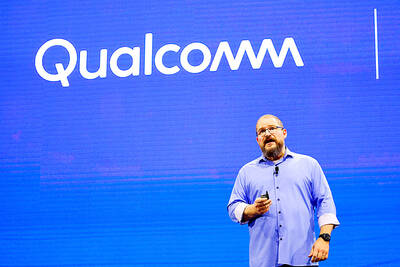Bank of America Corp’s Merrill Lynch & Co brokerage has cut its global semiconductor industry outlook to “negative” from “positive,” citing rising chip supply.
Intel Corp, the world’s largest chipmaker, and Texas Instruments Inc had their investment ratings lowered to “neutral” from “buy,” Dan Heyler, Hong Kong-based head of Asian semiconductor research, said yesterday.
Chip manufacturers including Taiwan Semiconductor Manufacturing Co (TSMC, 台積電), the world’s largest custom chipmaker, have raised equipment spending and production in anticipation of a rebound. Industry association WSTS Inc expects sales to climb 12.2 percent next year after declining 11.5 percent this year, it said on Tuesday.
“There’s a growing disparity between supply growth and consumption, therefore the downside risk to earnings is increasing,” Heyler said. “We think the supply chain will be aggressively replenished through to March.”
TSMC was reduced to “neutral” from “buy,” while United Microelectronics Corp (聯電), the second-largest custom chipmaker, and Advanced Semiconductor Engineering Inc (日月光半導體), the world’s largest chip tester and packager, were both lowered to “underperform” from “buy,” Heyler said.
Utilization of Asian chip production and testing capacity will decline by between 10 percentage points and 15 percentage points from a “mid-90s” percentage currently, Heyler said.
TSMC on Oct. 29 raised its spending budget for this year for factories and equipment to US$2.7 billion from a July 30 estimate of US$2.3 billion and said that figure would increase next year.

Intel Corp yesterday reinforced its determination to strengthen its partnerships with Taiwan’s ecosystem partners including original-electronic-manufacturing (OEM) companies such as Hon Hai Precision Industry Co (鴻海精密) and chipmaker United Microelectronics Corp (UMC, 聯電). “Tonight marks a new beginning. We renew our new partnership with Taiwan ecosystem,” Intel new chief executive officer Tan Lip-bu (陳立武) said at a dinner with representatives from the company’s local partners, celebrating the 40th anniversary of the US chip giant’s presence in Taiwan. Tan took the reins at Intel six weeks ago aiming to reform the chipmaker and revive its past glory. This is the first time Tan

Qualcomm Inc is strengthening its partnerships with Taiwan Semiconductor Manufacturing Co (TSMC, 台積電) and original design manufacturers (ODMs) in Taiwan as it expands its presence in the artificial intelligence (AI) computer market, CEO Cristiano Amon said in Taipei yesterday ahead of the annual Computex trade show. “Historically we’ve always been a very big customer of TSMC, and we continue to be,” Amon said during a media Q&A session. “For chip manufacturing, we’re among the largest fabless [semiconductor designers],” he said, noting that Qualcomm, a leading provider of mobile and AI-enabled chipsets, ships about 40 billion components every year, with TSMC being

‘FAILED EXPORT CONTROLS’: Jensen Huang said that Washington should maximize the speed of AI diffusion, because not doing so would give competitors an advantage Nvidia Corp cofounder and chief executive officer Jensen Huang (黃仁勳) yesterday criticized the US government’s restrictions on exports of artificial intelligence (AI) chips to China, saying that the policy was a failure and would only spur China to accelerate AI development. The export controls gave China the spirit, motivation and government support to accelerate AI development, Huang told reporters at the Computex trade show in Taipei. The competition in China is already intense, given its strong software capabilities, extensive technology ecosystems and work efficiency, he said. “All in all, the export controls were a failure. The facts would suggest it,” he said. “The US

NEW PRODUCTS: MediaTek has been diversifying its product lines to minimize operational risks as mobile chips remain the company’s biggest revenue source MediaTek Inc (聯發科), the world’s biggest supplier of smartphone chips, yesterday said the tape-out process for its first 2-nanometer chip would take place in September, paving the way for volume production of its most advanced chip, likely to be its next-generation flagship smartphone chip, around the year-end at the earliest. MediaTek has been leveraging advanced process technologies from its foundry partner, Taiwan Semiconductor Manufacturing Co (TSMC, 台積電), to build its flagship mobile phone chips, a segment it once relinquished and then recovered four years ago as it released its Dimensity series. In the semiconductor industry, a tape-out refers to the